Artists' Writing
Artists' Writing
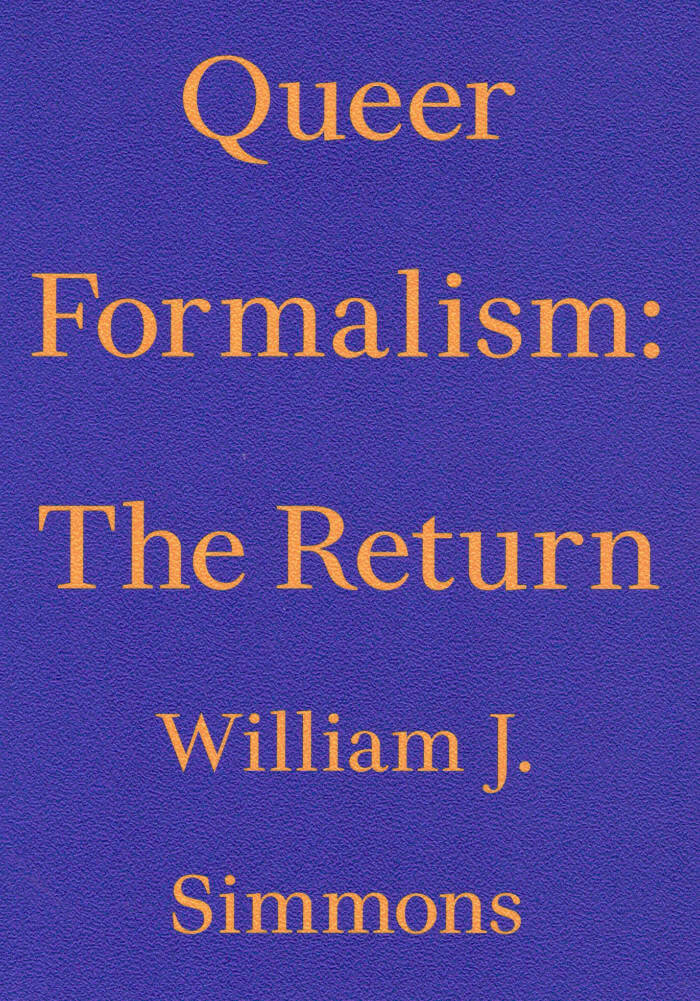
Queer Formalism: The Return
A new kind of queer art writing.
Queer Formalism: The Return expands upon William J. Simmons's original, influential essay “Notes on Queer Formalism” from 2013, offering novel ways of thinking about queer-feminist art outside of the critical-complicit and abstract-representational binaries that continue to haunt contemporary queer art. It therefore proposes a new kind of queer art writing, one that skirts the limits imposed by normative histories of art and film.
Artists addressed in Queer Formalism: The Return include: Sally Mann, David Lynch, Lars von Trier, Math Bass, Lorna Simpson, Laurie Simmons, Alex Prager, Lana Del Rey, Jessica Lange, and Louise Lawler, among others.

rosa rosa rosae rosae
Produced in conjunction with the exhibition that took place at Maison Pelgrims (10/9-23/10/2021), the book presents original interventions by the artists of the rosa rosae rosae project : Alicia Jeannin, Alicja Melzacka, Angela Detanico & Rafael Lain, Annaïk Lou Pitteloud, Audrey Cottin, buren, Charlie Usher, Eleanor Ivory Weber, Eva Giolo, Henry Andersen, Jan Vercruysse, Maíra Dietrich, Marc Buchy, Maxime Jean-Baptiste, Niels Poiz, Oriol Vilanova, Sabir (Lucie Guien, Amélie Derlon Cordina, Sophie Sénécaut / Perrine Estienne, Kevin Senant, Maud Marique, Pauline Allié, Carole Louis), Slow Reading Club, Sofia Caesar, Surya Ibrahim, Yiannis Papadopoulos, Yoann Van Parys
Edited by Pauline Hatzigeorgiou / SB34
Graphic design by Tipode Office
The book was produced with the support of Fédération Wallonie-Bruxelles (aide à l'édition) and Région Bruxelles-Capitale (Image de Bruxelles)
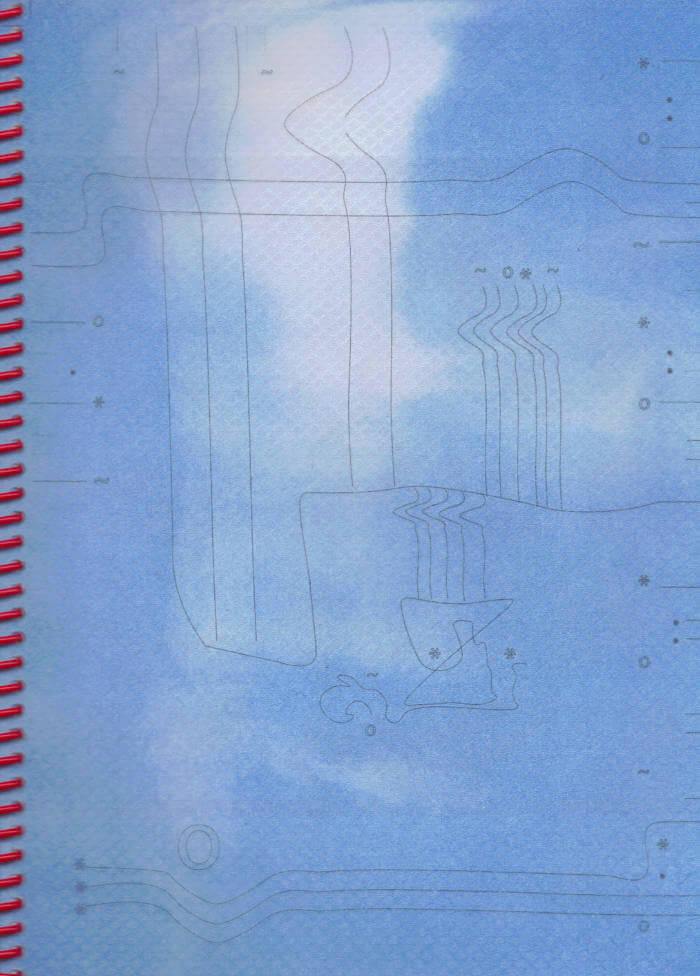
Under the Rainbow - Over the Weather
Speculative fiction magazine with contributions by 16 international (comic)artists/ writers/ designers/ curators/ witches. Exploring the world in the 4th millennium through images, words and dreamscapes.
Plastic coil bound with plastic covers.
Transparent cover with “A Short Manifesto” by Dutch conceptual artist Stanley Brouwn.
48 fold out pages, 185x262mm (foldes out to 185x365)
Riso printed on 100gr Munken Lynx by Hocus Bogus Publishing
Edition of 150
Cover design by Finn Melvin Caird
Design, layout and proofread by Yahaira Brito Morfe
Edited, printed and bound by Dennis Muñoz Espadiña
Language: English

Writing in Space, 1973–2019
Writing in Space, 1973-2019 gathers the writings of conceptual artist Lorraine O'Grady, who for over forty years has investigated the complicated relationship between text and image.
A firsthand account of O'Grady's wide-ranging practice, this volume contains statements, scripts, and previously unpublished notes charting the development of her performance work and conceptual photography; her art and music criticism that appeared in the Village Voice and Artforum; critical and theoretical essays on art and culture, including her classic "Olympia's Maid"; and interviews in which O'Grady maps, expands, and complicates the intellectual terrain of her work. She examines issues ranging from black female subjectivity to diaspora and race and representation in contemporary art, exploring both their personal and their institutional implications.
O'Grady's writings—introduced in this collection by critic and curator Aruna D'Souza—offer a unique window into her artistic and intellectual evolution while consistently plumbing the political possibilities of art.
Edited by Aruna D'Souza

Bookmarks of sorts
Afternoon Editions no. 5: a collection of found papers annotated by Jeroen Peeters, titled Bookmarks of sorts. During several years Jeroen Peeters collected notes left by readers in library books: faded reader tickets, scraps with notes, a shopping list, train tickets and other little papers used as bookmarks. He noted each time the date and the book in which they were found. Afterwards he wrote commentaries to this collection, an essay on alternative reading practices, marginalia and extra-illustration, on the exchange between readers and the imaginary community lingering in all those library books.

Weaknesses
Afternoon Editions no. 2: text and drawings by Chrysa Parkinson titled Weaknesses. Between January and March 2019 Time has fallen asleep in the afternoon sunshine was presented as a solo-exhibition at Index Foundation in Stockholm. During this period Chrysa Parkinson was invited as a guest writer for Afternoon Editions. Weaknesses is a leap in memory.

On the Self-Reflexive Page II
Originally published in 2010, ‘On the Self-Reflexive Page’ is part artist’s book and part essay, part literary excavation and part typographical miscellany. For this second incarnation of Louis Lüthi’s anthology of thematically arranged pages, the original material has been significantly expanded and revised. Like its predecessor, the new version proposes a typology of nonverbal elements found in novels, short stories, and essays. In each of the pages reproduced here, the prose is interrupted by one of these nonverbal elements, from black or blank pages, drawings or collages, photographs or film stills, to fragments of text or visual poems that are distinct from a conventional page layout.
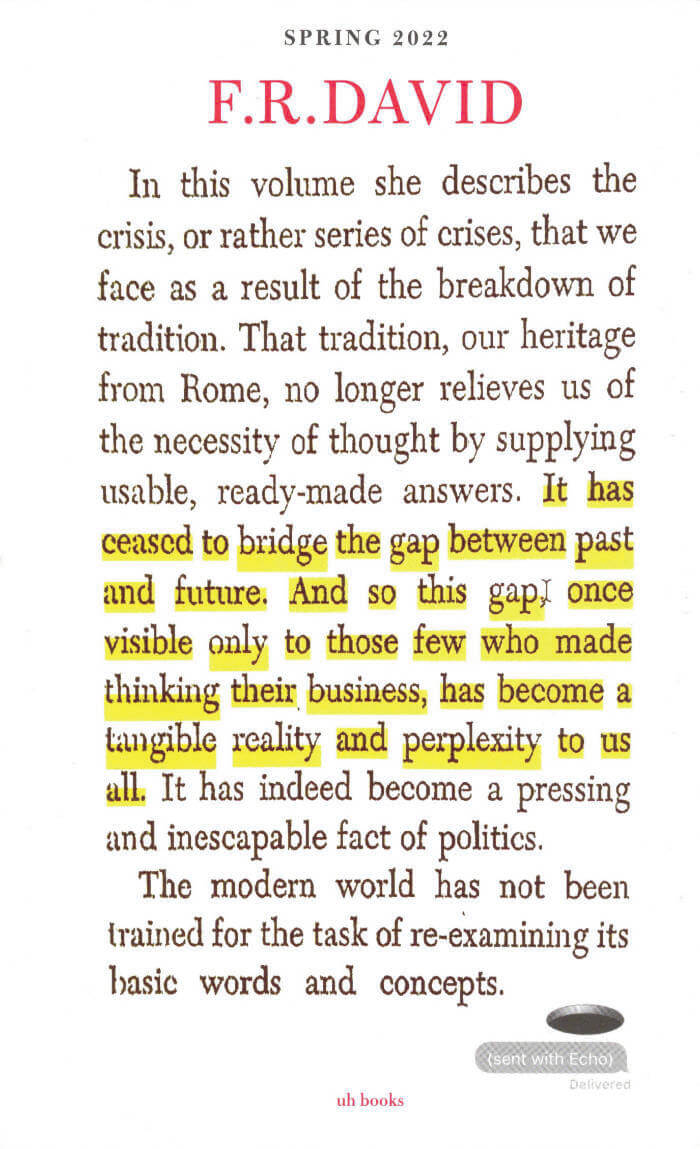
F.R. David - "Take, Eat"
Andrea di Serego Alighieri, Will Holder
F.R.DAVID is a typographical journal, dealing with the organisation of reading and writing in contemporary art practises.
The 21st issue, “Take, Eat” is edited by Will Holder, with Andrea di Serego Alighieri. Andrea’s image-heavy talk on word spacing and vocalisation runs all the way through, on the right-hand pages: the opposite pages contain responses from Will. The issue almost stifles the triangulated space of image, context and commentary; and speaks of the moment between words, things, people, images, perception, past, present and future, between Andrea’s pages and Will’s, as where meaning might breathe.
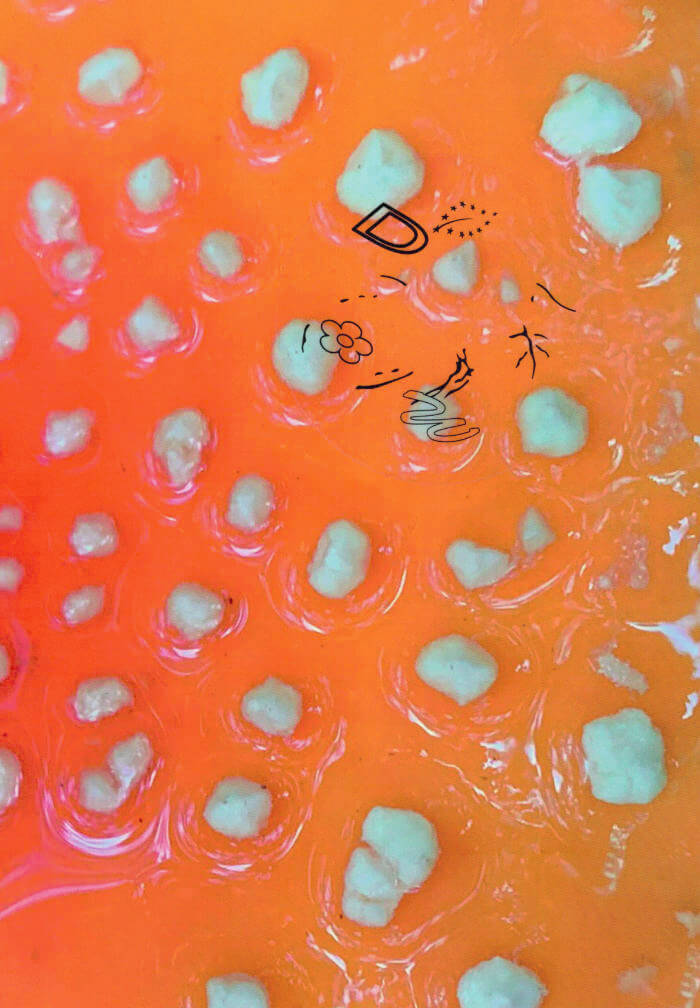
DAISYWORLD MAGAZINE #3
ROT, LANGUAGE & A STRAY BUTTERFLY
CONTRIBUTORS Eady van Acker, Anouk Asselineau & Myrto Vratsanou, Britt Browne, Finca Tierra Negra, Yuri Hasegawa, Celine Caly, Aimilia Efthimiou & Comfy Shrooms, Paige Emery, Elizaveta Federmesser, Edwin Godínez, Meg Hadfield, Freya Häberlein, Johanna Hedva, Zsófia Jakab, Lijuan Klassen, Marijn van der Leeuw, Juliette Lizotte, Niklaus Mettler & Anja Wille-Schori, Hatty Nestor, Kamila Sipika, Zazie Stevens & Alex Valentina.
DAISYWORLD MAGAZINE is a seasonal art publication on perception, the sensory, the non-human, ecology & erotica with an emphasis on interconnectedness. The artist's intimate knowledge based on observation, questioning anthropocentrism through beauty & language. Reflecting on the past season while softly moving into the next, each issue launches in-between seasons; appreciating experience, transition, and metamorphosis instead of anticipating the next big thing
Cover image: Zazie Stevens

The Carrier Bag of Recipes
To write, to boil, to cook ideas, stir them all, spice them up with some references and again write and knead the dough out of it. To what forms can recipes lead? This is the central question of this thesis. Recipes follow a certain literary genre. Whether carved on stones or written along the horizontal edges of a notebook, they all conform to a specific structure. In the text I analyse these structures, to show the way in which the recipe itself unveils its deeper meanings, concerns, and secrets. Why, when, who and how are fundamental questions I ask, while I read out loud a recipe about macaroni from the 1495 – or when I look at a Sumerian tablet where a Cuneiform system of writing states that epilepsy is a tease of the demons. Material form, literary form and social interaction are the flavors I want to bring up from each recipe I use as an example, hoping to find a way to understand how these three elements are melted together to form an interconnected circle.
Published Nov, 2021.

CHOREOGRAPHY / KOREOGRAFI (2021)
CHOREOGRAPHY/KOREOGRAFI is an anthology published in three editions, consisting of texts written by artists active within the field of dance and choreography in the Nordic countries.
With the anthology we wish to build a rich and complex understanding of what choreography is and can be. We approach choreography as its own field of knowledge, and try to reach out and contribute to a larger Nordic disciplinary community. Our ambition is to protect a space for reflection that we experience as threatened, that is to say the thinking from and around the artistic works and practices.
Each contribution is build around a specific issue requested by the editors and developed in dialogue with the contributors, there are independent texts as well as conversations and interviews. All texts exist in both Scandinavian and English versions. We have curated the texts we’ve been missing and the conversations we have dreamt of reading.
The anthology is edited and published independently by artists based in Oslo. The first edition was launched in May 2016 and edited by Solveig Styve Holte, Ann-Christin Kongsness and writer Runa Borch Skolseg. The second edition was launched in October 2018 and edited by Solveig Styve Holte, Ann-Christin Kongsness and Venke Marie Sortland. The third edition was launched in September 2021, and edited by Holte, Kongsness and Sortland as well, all three of us work as dancers, choreographers and writers. Helge Hjort Bentsen is behind the graphic design for the first and second edition, Kim Hiorthøy did the graphic design for the third edition.
The third and last edition of CHOREOGRAPHY consists of eight newly written texts. The anthology still has a Nordic focus, but this time we have decided to go deeper into certain issues, regardless of geographical context. In this edition we also have a stronger interdisciplinary focus, in addition to following up some threads from the two former editions; marginal perspectives with a base in feminist, queer and post-colonial traditions, form experiments that explore text as an extended choreographic practice, texts by and about and as collectives, how to make artistic research available and how the infrastructures that we depend on influences our artistic practices and vice versa.
The contributors for the third edition are Sigrid Øvreås Svendal, Ingri Midgard Fiksdal, Kristine, Tjøgersen, Chloe Chignell, Hanna Järvinen, Goro Tronsmo, Solveig Styve Holte, Roza Moshtaghi and Karen Eide Bøen.
CHOREOGRAPHY (2021) is supported by Arts Council Norway.

Exo Revue: Si j’aurais su
Sam Bouffandeau, Chloé Delchini and 2 more
Revue du Master de Textes et de Création Littéraire de la Cambre*
Avec les textes de: Sam Bouffandeau, Chloé Clemens, Chloé Delchini, Perrine Estienne, Robin Faymonville, Gabriel René Franjou, Justine Gensse, Adèle Goardet, Bastien Hauser, Giulia Lazzara, Cyprien Muth, Sephora Shebabo.
* Le Master en Textes et Création Littéraire de l’École Nationale Supérieure des Arts Visuels de La Cambre propose un programme de formation aux étudiants qui visent à faire des métiers du texte et de la création littéraire leur avenir professionnel. Il s’adresse principalement aux jeunes écrivains et, plus généralement, à l’étudiant qui souhaite professionnaliser sa démarche artistique en lien avec la pratique de l’écrit en la confrontant à d’autres écrivains, à des éditeurs et à des professionnels reconnus de la littérature, l’informer et l’enrichir de nouveaux savoirs et de nouvelles compétences. Considérant le travail du texte et ses différentes formes comme des expressions majeures de l’homme à travers l’histoire, et les littératures des différents continents comme un art à part entière dans le champ des pratiques artistiques contemporaines, ce Master s’inscrit dans une démarche ouverte de production, de réflexion et d’instruction de l’écrit dans un monde en devenir.
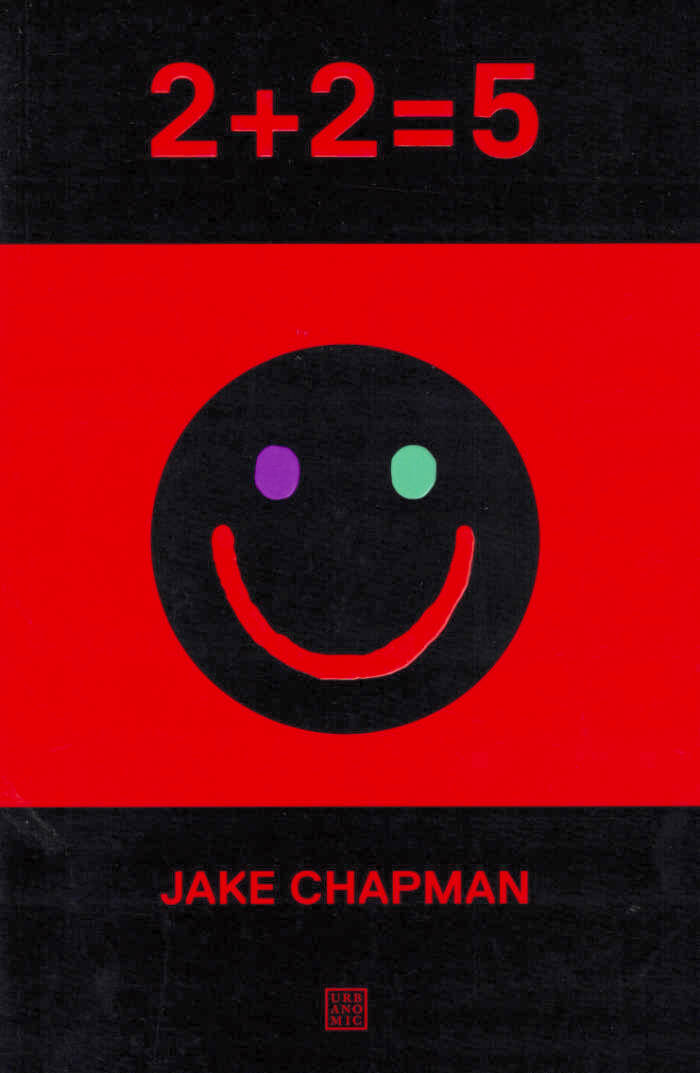
2+2=5
With 2+2=5, George Orwell's flawed masterpiece finally receives a much-needed rectification, as Jake Chapman takes us on a bad trip into an atrocious alt-Eurasia - a nightmare utopia of 24/7 self-expression, mandatory wellbeing, yogic breathing, and promiscuous empathy. Yippie wonks in open-toed sandals have ejected the evil capitalist overlords, compassion and charity reign supreme, buckwheat salad and artisan cashew cheese are in plentiful supply, and all strive to live their best life, all the time.
Employed by the Ministry to rectify misfortunes issuing from a curious glitch in the system, Winston Smith finds that his creative urges are unexpectedly awoken, and he is driven to express his deepest place, voice, and hurt through the medium of poetry. But what connects Winston's furtive scribblings in My Big Book of Me to the unpleasantnesses emanating from the deep glitch? Is Julia really the perfect kooky carefree soulmate she seems to be? Can O'Brien be trusted? And when does the new season of Big Brother start?
An all-you-can-eat quinoa buffet of wrongthink, Chapman's twisted vision is a bracing reminder that dystopia is just wishful thinking, and that the worst can always get worster.

Auditing Intimacy
Office for Joint Administrative Intelligence
Auditing Intimacy is a collection of postal correspondence, photographs and declassified documents produced by Chris Dreier and Gary Farrelly between 2015 and 2020 under the banner of their shared practice The Office for Joint Administrative Intelligence. In a spirit of transparency and full disclosure, the publication contains a certified, independent and critical audit of the practice by Alicja Melzacka. The project was undertaken to commemorate the fifth anniversary of O.J.A.I.
Edited by Chris Dreier and Gary Farrelly
Artworks by Chris Dreier and Gary Farrelly
Essay by Alicja Melzacka
Design by Zero Desk
Documentation by Pauline Miko
Published by Fantôme Verlag
174 pages
Office for Joint Administrative Intelligence is the collaborative practice of artists Chris Dreier (DE) and Gary Farrelly (IRE/BE). The work is fuelled by a recurring obsession with architecture, infrastructure, finance, institutional power and DIY ritualism. O.J.A.I. pursues a strategy of self-institutionalisation where tools and codified rules of engagement are appropriated from economic and political infrastructures for the purposes of structuring intimacy and conjuring autonomy.
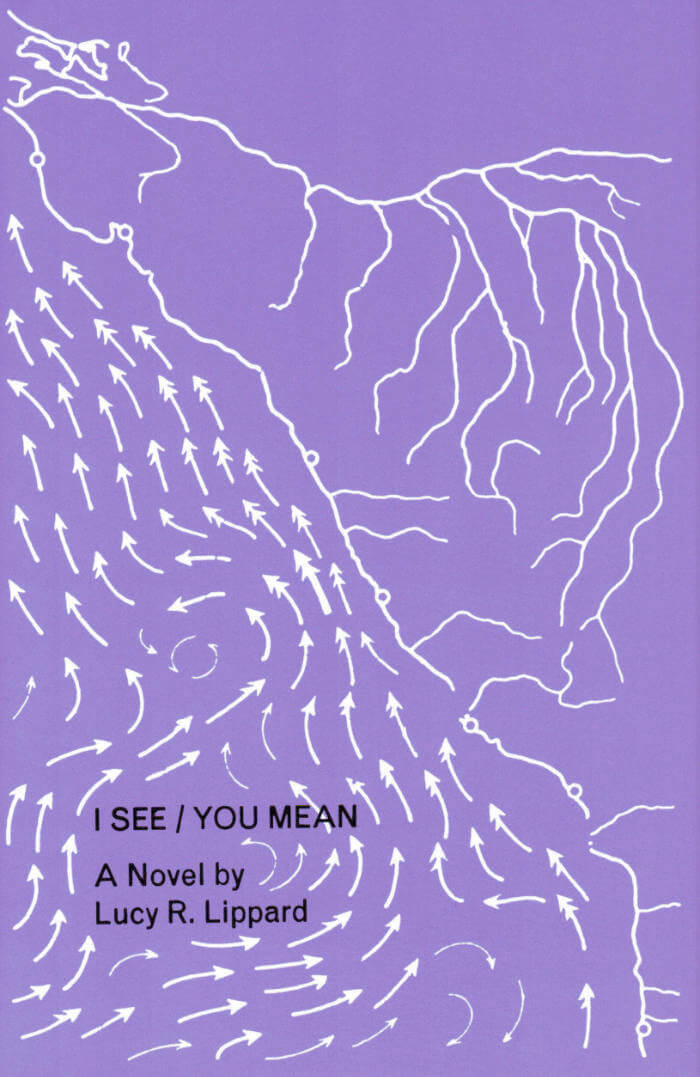
I See / You Mean
I See / You Mean is an experimental novel about mirrors, maps, relationships, the ocean, elusive success, and possible happiness. Through a collage of verbal photographs, overheard dialogue, sexual encounters, found material, and self identification devices (astrology, the I Ching, palmistry, Tarot), it charts from past to future the changing currents between two women and two men: a writer, a model/stockbroker/maybe dictator, a photographer, and an actor. A lot happens between the lines. Art critic Lucy Lippard wrote this novel in 1970 and became a feminist in the process: “I started writing and realized I was ashamed to be a woman. Then I had to find out why. Then I got very angry. The fragmented visual form came out of contemporary art and the conflicting emotions of 1960s political confrontation; they suggested a new way to put things back together—an open-ended, female way that didn’t pretend conclusions.”
Lucy R. Lippard is a writer, activist, and curator. She is the author of twenty-five books on contemporary art and cultural criticism and has curated some fifty exhibitions in the United States, Europe, and Latin America.
Afterword by Susana Torre
Edited by Jeff Khonsary

Fieldnotes - Issue nr. 2
A quarterly print journal publishing new writing and artworks with a focus on practices that work between disciplines and against type. There is always a third thing between two things that are known; we are interested in whatever there is between translations/transitions, things-in-progress, converging genres, methods of excavation and formal innovation. The purpose of the journal is to provide a test site for ideas and research; a space for experimental modes and new prototypes.
The second issue of Fieldnotes contains new work by:
Apichatpong Weerasethakul
Steve Dutton
Liesl Ujvary
Akio Yuguchi
Evan Lavender-Smith
Dodie Bellamy
Paul Maheke & Giles Bailey
Yan Jun
Emily Charlton
Ed Atkins
Sam Buchan-Watts
Elizabeth Price
Mary Mussman
Carolyn Ferrucci
Hanne Lippard
Charlie Godet Thomas
Hannah Regel
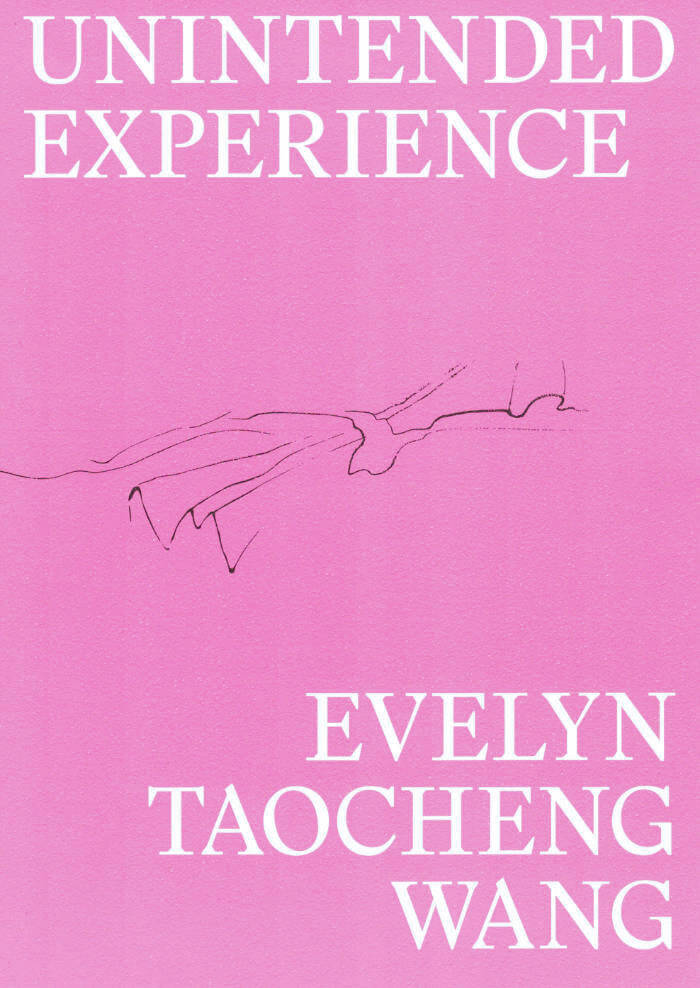
Unintended Experience. A job in Amsterdam
A new version of After 8 Books' first publication and bestseller: Evelyn’s adventures as a transgender masseuse in Amsterdam, back when she was a young artist, supporting herself by working in a massage salon. The texts are witty, sharp and thoughtful, reflecting a very specific community of friends and coworkers and its counterpart, the male clientele. The drawings illustrating those texts are dreamlike watercolors, perfect companions to Unintended Experience’s diaristic journey.

You have within you something stronger and more numinous
'You have within you something stronger and more numinous' by Margarita Maximova is a collection of extracts of letters sent to her by her mother over the course of ten years.

Saliva
Ricardo aka Johan, Kamilé Krasauskaité and 1 more
Saliva est le résultat d'une résidence collaborative en octobre 2021 à Fructôse, Dunkerque.
Édition de 100 exemplaires.
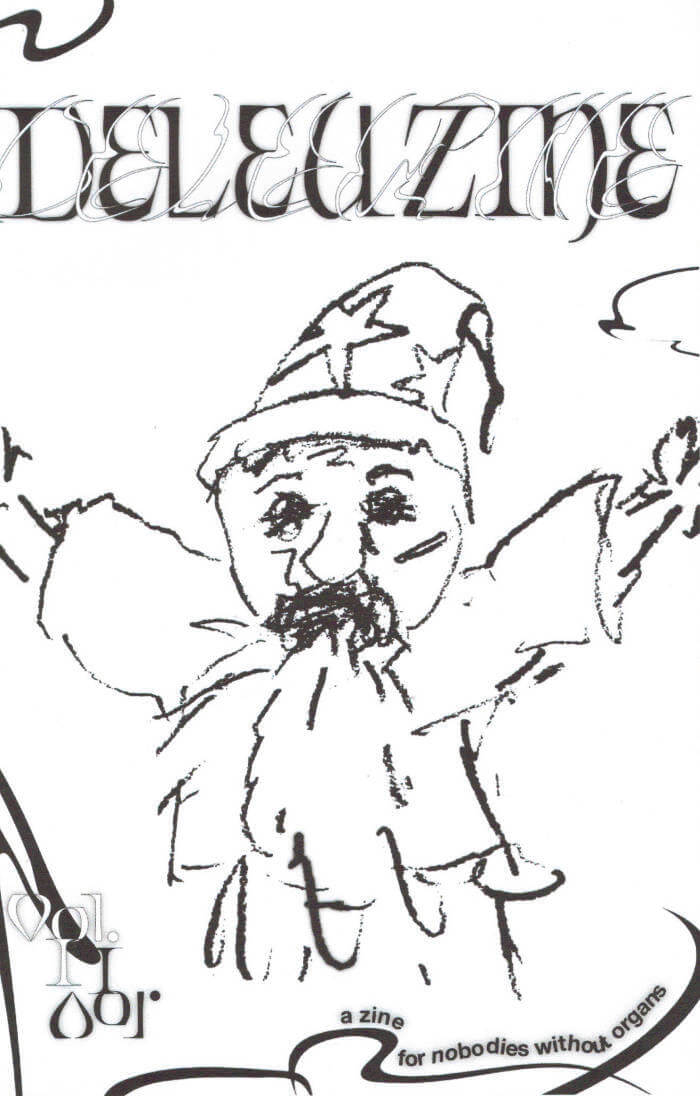
Deleuzine Vol. 1 - Sprouting In All Directions
Deleuzine: A Zine for Nobodies Without Organs is an experimental publication inspired by the writings of French philosopher Gilles Deleuze, as well as figures whose life or work can be said to exemplify aspects of Deleuze’s philosophy of life, including Antonin Artaud, Ezekiel Mphaphele’s Wanderers and Kathy Acker among others. Encompassing the fields of literature, philosophy, ethnography, archaeology, and the arts, the publication aims at a radical exploration (and exploitation) of word, image, and printed matter towards beauty, but also aesthetic and political freedom.
With contributions by: Egle Ambrasaite, Alex Aspden, Edoardo Biscossi, Sabeen Chaudhry, Ruby Conner, Genevieve Costello, Andrew Culp, Anna Luisa Di Lauro, Sophie Fitze, Roxman Gatt, Helena Grande, Rose Higham-Stainton, Sevana Holst, Patrick McAlindon, Geiste Kincinaityte, Michele Muraca, Holly Rowley, Katie Shannon, Natalie Stypa, Katarina Sylvan, Elaine Tam, Haydée Touitou, Samuel White, Romy Day Winkel.
Edited by: Lilly Marks, Sabeen Chaudhry and Holly Rowley.

Curatorial Feelings
Curatorial Feelings is a book that collects arts practitioner Eloise Sweetman’s writing from the past decade — written on the occasion of exhibitions she curated, written on and for individual artworks, as well as for public talks.
Sweetman often wrote while, and not before, the artworks were on view. The time of retrospection, and of being with artworks, imbues her language. Moving between prose and poetry, impressions and reflections, coursing through the writing is a commitment to senses, to subjectivity, to social responsibility.
Sweetman’s writing contributes to a genre of curators’ writing that takes things to heart, that takes things personally. Calling out her ‘curatorial feelings’ juxtaposes and unites the two modes of engagement: as a curator and as a sentient being. Curatorial feelings foreground subjectivity, intuition, senses, and belief systems, while pushing for new art historical narratives and an ethical professionalism

Romance Utopia
Romance Utopia is a research project is both a digital archive, a radioshow, a videowork and a collection of essays around notions of romance.

Diaries and Dreams – 1976-1979
Second volume of Ion Grigorescu's translated diaries, assembled like a small literary and art-historical sensation of the period between 1976 and 1979.
In recent years, the work of Ion Grigorescu, one of the seminal Eastern European visual artists of his generation, has attracted increasing attention in the West. This volume is the second of his translated diaries—the first from 1970 to 1975 was published in 2014 by Sternberg Press—and is assembled like a small literary and art-historical sensation of the period between 1976 and 1979. It not only counters the facile reading of Grigorescu's practice in the context of Conceptual art and performance art, but provides insight into the artist's multifocal thinking, which incorporates an original critique of modernism, the dystopian effects of an instrumentalized idea of reason and rationality, an analysis of subjectivity, and a penetrating gaze into a dialectic of secrecy and elucidation, of exposure and mystification.
Grigorescu's diaries are written notes revolving around the status of the image and investigate the relation of the body to society and of art to the world through a phenomenological approach. His work proposes a parallel conception of the public made tangible through the eloquence of the body.
In poetic language full of powerfully pictorial metaphors, Grigorescu's reflects on the tension between the realistic effects of the image, the suppression of realism, and the hidden traces the gaze holds through the activities of the increasingly present unconscious of collective memory. Along with the drawings, paintings, photographs, and sketches that accompany them, the diaries serve as an introduction that open the possibility of conceiving Grigorescu's art as a rare evocation of a singular way of thinking: a stance.
Ion Grigorescu (born 1945, lives and works in Bucarest) is one of the most emblematic artistic personalities of the post-war period in Romania, a key figure of conceptual artin Eastern Europe.

Tense
Tense is a never-realised publication, written and composed by Lucy Lippard and Jerry Kearns in 1984, that only now has been released in a very limited run on our imprint. The book accompanied the exhibition Top Stories, which took a closer look at the 29 issues of the prose periodical with the same title, founded in the late 1970s by Anne Turyn. Top Stories was dedicated to fiction by emerging women artists and writers from that time. Tense was originally intended to become part of the series as well, but never made it to print. It was only recently – during the making of the exhibition at Amsterdam’s Kunstverein – that the original mock-up was retrieved from the editor’s archives and finally sent off to the printer.
40 p, ills colour & bw, 13 x 21 cm, pb, English